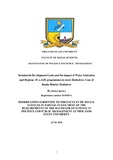Please use this identifier to cite or link to this item:
https://cris.library.msu.ac.zw//handle/11408/4068Full metadata record
| DC Field | Value | Language |
|---|---|---|
| dc.contributor.author | Ngwira, Mwiza | - |
| dc.date.accessioned | 2020-12-17T13:54:49Z | - |
| dc.date.available | 2020-12-17T13:54:49Z | - |
| dc.date.issued | 2018-06 | - |
| dc.identifier.uri | http://hdl.handle.net/11408/4068 | - |
| dc.description.abstract | The purpose of the study was to analyze the impacts of W.A.S.H projects in Runde Rural District. The gradual decline of W.A.S.H services from the 1990s due to the economic downfall affected both urban and rural communities. This created wide disparities between the rural and urban communites in terms of access to clean water and good sanitation with the rural areas being the most affected. As a result the livelihoods, health and well being of the rural people decreased significantly as the residents were exposed to a number of water related diseases due to poor sanitation and a lack of access of water to practice hygiene practices. The knock on effect of a lack of reliable W.A.S.H infrastructure and services consequently represses the ability of the country to achieve the Sustainable Agenda 2030 set goals. The findings of the research can therefore be utilized in finding ways to improve and enhance W.A.S.H programmes and the W.A.S.H sector in providing efficient and effective service delivery to the population. The study employed qualitative methods of gathering data as the researcher was focused on the perceptions of the participants towards the programme. In dealing with the objectives of the research, the study used a case study as a research design. A sample of 45 respondents consisting mainly of villagers was chosen to participate in the study. Convenience and purposive sampling techniques were used to select the participants during data collection. The research established that W.A.S.H has an immense impact on the state of health of people.It also identified the role of W.A.S.H. in promoting economic development. Moreover, the promotion of gender equality in the rural area hinges on reliable W.A.S.H. service provision. To address these challenges,there is a need to improve the quality and accessibility of water to residents. There is a need to adopt behavior change policies that help to promote the culture of sanitation and hygiene practices for the optimum use, and benefit from W.A.S.H infrastructure. The study concludes by giving recommendations based on research findings. | en_US |
| dc.language.iso | en | en_US |
| dc.publisher | Midlands State University | en_US |
| dc.subject | sustainable development | en_US |
| dc.subject | water sanitation and hygiene | en_US |
| dc.title | Sustainable Development Goals and the impact of Water Sanitation and Hygiene (W.A.S.H) programmes in rural Zimbabwe: Case of Runde District Zimbabwe | en_US |
| dc.type | Thesis | en_US |
| item.cerifentitytype | Publications | - |
| item.openairecristype | http://purl.org/coar/resource_type/c_18cf | - |
| item.languageiso639-1 | en | - |
| item.openairetype | Thesis | - |
| item.fulltext | With Fulltext | - |
| item.grantfulltext | open | - |
| Appears in Collections: | Bachelor Of Science In Politics And Public Management Honours Degree | |
Files in This Item:
| File | Description | Size | Format | |
|---|---|---|---|---|
| MIDLANDS STATE UNIVERSITY copy in case emailmhg.pdf | Full Text | 905.19 kB | Adobe PDF |  View/Open |
Page view(s)
512
checked on Mar 1, 2026
Download(s)
548
checked on Mar 1, 2026
Google ScholarTM
Check
Items in MSUIR are protected by copyright, with all rights reserved, unless otherwise indicated.



